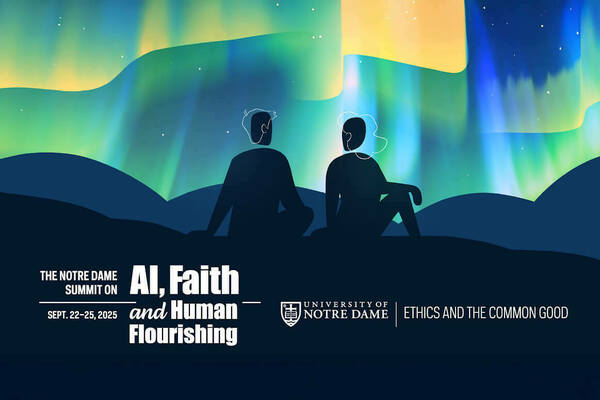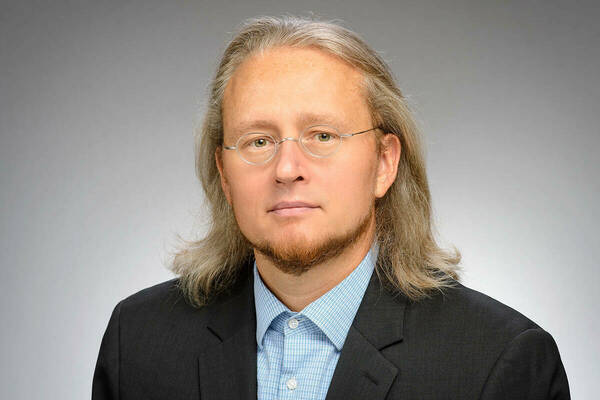Psychologists win NIH grant to study how interventions can prevent child maltreatment
Each year, more than 3 million children in the U.S. are part of an investigation of suspected child abuse or neglect. Two psychologists at the University of Notre Dame are working together to lower that number.
Professors Laura Miller-Graff and Kristin Valentino have each developed programs to help prevent or reduce child maltreatment at a critical point for development — Miller-Graff during pregnancy and Valentino during early childhood.
Now, the two are bringing their programs together with a $3.1 million grant from the National Institutes of Health (NIH).
“This is a great example of what can happen when faculty members have the opportunity to collaborate and work closely with each other and generate innovative ideas together,” said Valentino, the William J. Shaw Center for Children and Families Collegiate Chair in the Department of Psychology.
Over the next five years, the clinical trial will assess whether the prenatal and early childhood programs work in tandem to prevent child maltreatment.
“This project represents, more broadly, ways that researchers like us could collaborate to really create some exciting synergies around things that have been developed independently,” Miller-Graff said. “Now, it can be brought together in an interesting way.”
The power of collaboration
As a graduate student, Miller-Graff studied a program for mothers and older children who were exposed to intimate partner violence (IPV), which is physical, sexual or emotional abuse stemming from romantic relationships. As many as 40 percent of U.S. women experience IPV in their lifetime, and it can have detrimental long-term effects on child development for children living in homes where it occurs. IPV is also one of the biggest risk factors for child maltreatment.
Though the program was effective at reducing IPV and improving maternal and child outcomes, Miller-Graff wondered if earlier intervention could prevent the onset of chronic violence in the children’s lives.
“That is really what got me interested in doing work in pregnancy, thinking about, ‘OK, how do we set things up better from the start for families?’” she said.
Miller-Graff, now a professor of psychology and peace studies at Notre Dame, worked with Kathryn Howell at the University of Wisconsin-Madison to adapt this program to specifically address the developmental needs and concerns of pregnant women. Known as the Pregnant Moms’ Empowerment Program (PMEP), this five-session program works to reduce intimate partner violence among pregnant women, improve maternal mental health and support early positive parenting practices with the goal of preventing subsequent child maltreatment.
Valentino’s research takes an alternate approach by intervening in the early childhood years — another period when the risk of child abuse and neglect is elevated. Valentino, the director of the William J. Shaw Center for Children and Families, developed the Reminiscing and Emotion Training (RET) program, a six-session intervention that gives mothers tools to improve their emotional support and response to their child’s needs.
“This is an exciting opportunity to collaborate and be able to test both models together,” Valentino said. “We’re hoping that receiving both interventions sort of has synergistic benefits for both mom and child.”
Building connections
With the support of the NIH grant, Miller-Graff and Valentino will commence their research by working with families in South Bend and Memphis, Tennessee.
“I think one of the primary reasons this project was selected for funding was because it’s offering a new approach to child maltreatment prevention, developmentally attuned at two different important critical stages — both prenatally and during early childhood,” Valentino said.
The ability to study how families engage with multiple programs over longer periods is often limited in research. This trial, though, will focus on the same women who have already participated in a previous NIH-funded clinical trial of the PMEP and re-randomize them for participation in RET once their child is of age.
“That’s unusual to see in the research,” Miller-Graff said. “We’re really excited to be able to continue to support families and follow them over a longer period of time.”
For Miller-Graff, the project is also a testament to the community built at the Shaw Center, which supports a number of programs for South Bend children and families.
“Positive relationships are central to good research, but maintaining those relationships takes time, effort and intention,” Miller-Graff said.
Factors like housing instability, which often accompanies chronic family violence, can understandably make it more challenging for families to remain involved in programs over the long term.
“One of the things that’s really special about being at Notre Dame is that we have such an outstanding community at the Shaw Center of staff members who have developed really amazing relationships with our families across projects,” she said. “Because of that community and support, we’re uniquely equipped to follow — and remarkably successful in following and supporting — families over time.”
For Valentino, who won the NIH Director’s Transformative Research Award in 2022, the project’s focus on prevention makes it especially meaningful and impactful. Because anyone — not just clinical psychologists or licensed social workers — can be trained to offer the intervention, it has great potential for scalability.
“One of my long-term goals is to be able to develop programs that can truly make a difference in the world and can prevent child maltreatment,” she said. “An important step along the way is to be able to assess the program rigorously in more than one clinical trial. This represents a really great opportunity for research that can get beyond my lab and into communities nationally.”
Originally published by at al.nd.edu on Nov. 18.
Contact: Tracy DeStazio, associate director of media relations, 574-631-9958 or tdestazi@nd.edu
Latest ND NewsWire
- Notre Dame to host summit on AI, faith and human flourishing, introducing new DELTA frameworkThe Institute for Ethics and the Common Good and the Notre Dame Ethics Initiative will host the Notre Dame Summit on AI, Faith and Human Flourishing on the University’s campus from Monday, Sept. 22 through Thursday, Sept. 25. This event will draw together a dynamic, ecumenical group of educators, faith leaders, technologists, journalists, policymakers and young people who believe in the enduring relevance of Christian ethical thought in a world of powerful AI.
- Notre Dame Democracy Initiative hosts bipartisan conversation with Western state governorsTwo Western state governors known to work across the aisle on policy issues such as water, housing and energy will visit the University of Notre Dame for a fireside chat about how Western state pragmatism can serve as a model for the country to overcome polarization.
- In new research, Roy Scranton explores climate change and the limits of human progressIn his most recent book, “Impasse: Climate Change and the Limits of Progress,” Scranton, an associate professor of English, defines the impasse he sees as “not only political and institutional, but cognitive, existential and narrative” and asserts that the only path forward is through embracing what he terms ethical pessimism. “A lot of people confuse pessimism with nihilism, apathy and despair,” Scranton said. “But pessimism is actually about recognizing our limits, letting go of unrealistic goals, finding solidarity in the fact of human suffering and doing what you can now, not in some utopian future.
- Notre Dame MBA launches deferred admission programThe Notre Dame MBA Deferred Admission Program allows candidates with little or no work experience, including college seniors, to secure admission before reaching the recommended three years of work experience to enroll.
- ‘Prebunking’ false election claims may boost trust in electionsIn recent years, democracies worldwide have seen a growing erosion of trust in election outcomes and institutions, driven in part by fears of widespread fraud. New Notre Dame research finds that “prebunking” — providing accurate information before false claims spread — boosts trust in elections more effectively than traditional fact-checking.
- ND experts on the canonization of Carlo AcutisAs the Church awaits the ceremony in St. Peter’s Square, where Pope Leo XIV will formally declare Acutis a saint, University of Notre Dame experts Kathleen Sprows Cummings, Brett Robinson and Timothy O’Malley reflect on his life and his path to sainthood.













